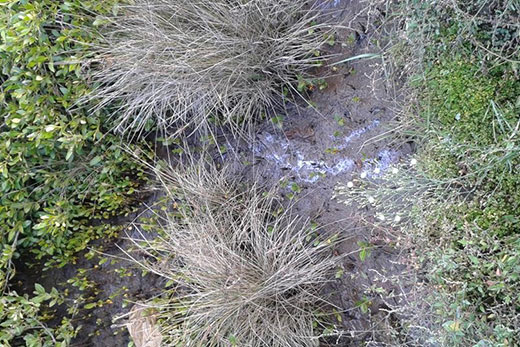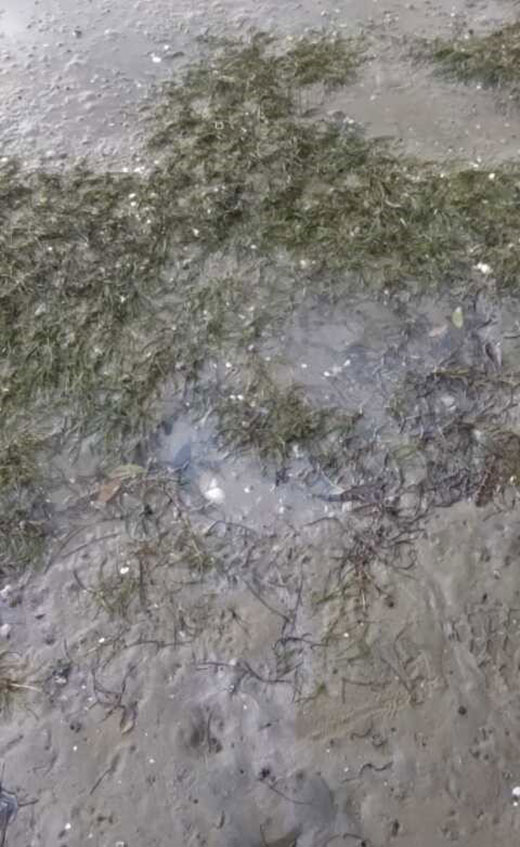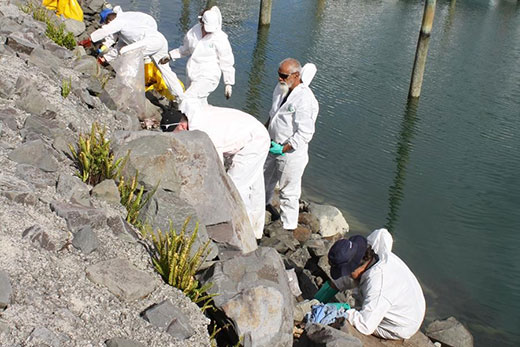Seagrass, sediment, cockles, mussels and other sea life will give Bay of Plenty Regional Council coastal scientists some answers soon about whether there'll be any further effects on the environment of last week's oil spill in Tauranga Harbour.
Clean-up crew scrubbing rocks at Bridge Marina. Photos: supplied.
The University of Waikato's Coastal Marine Group staff, Regional Council-funded Coastal Chair Dr Chris Battershill, marine ecologist Phil Ross and coastal ecosystem research programme Manaaki Taha Moana are providing advice and support to assist with the sampling.
Regional Council Environmental Scientist Robert Win has been gathering samples of sea life around the worst affected areas of Maungatapu, Bridge Marina and Motuopuhi (Rat) Island to test for any PAH contamination. He says polycyclic aromatic hydrocarbons, found in the heavy fuel oil which spilled on Monday, stay in the environment for a long time and can contaminate seafood.
'We've been taking samples, concentrating on kaimoana as these filter feed and if there's oil in the environment they are able to pick it up,” Robert says.
'The samples have to be carefully taken with strict quality controls, as they will be used in the formal investigation into the spill. Samples will then take two or three weeks to be tested at Hills Laboratories.
Baskets of mussels have been placed near the spill site and will be left there for two weeks before being tested against a basket of control mussels which have not been exposed to the spill. They will then be left for four weeks before being re-tested.
Robert says there would be ongoing monitoring of all edible species in the harbour to check for contamination.
'A good sign was seeing plenty of wading birds out there fishing this week, as Motuopuhi is an important bird roosting area.”
 Natural sheen.
Natural sheen.
Meanwhile, oil spill clean-up crews led by the BOP Regional Council are continuing their work to clean-up oil at Bridge Marina, the port wharf and Pilot Bay.
Regional On-Scene Commander Adrian Heays says he expects wind and tidal currents will have moved some oiled debris and vegetation around the harbour, so shoreline checks are continuing throughout the weekend.
'Local people can help by calling our pollution hotline on 0800 884 883 if they see any oil spots or oiled debris while they're out and about over the weekend.
'We can then get trained staff on-site quickly to collect it safely before the tide washes it away again.”
Some spots of weathered oil and oiled debris have also been confirmed in the Panepane Point area of Matakana Island. Local iwi are cleaning up there with assistance from Regional Council contractors.
Public have been asked to avoid contact with oiled material and stay away from oil wash-up areas. Any oiled wildlife found should be reported to DOC 0800 362 468 (0800 DOC HOT).
Boat owners are reminded not to clean their boats or gear with any aggressive chemicals as this may cause more contamination. Please contact your marina operator for advice. Mobil has set up two 0800 numbers. Boat owners wanting advice about cleaning can call 0800 895 011. Boat owners wanting to make insurance claims to Mobil can contact 0800 692 524.
What to look for:
There are two possible oily sheens people may see – natural or one caused by a spill. We've included descriptions below, but if you're still unsure, call the Pollution Hotline phone 0800 884 883 so it can be checked.
 Fuel oil slick.
Fuel oil slick.



1 comment
crazy
Posted on 04-05-2015 22:44 | By Capt_Kaveman
there is still no fast spill response team
Leave a Comment
You must be logged in to make a comment.